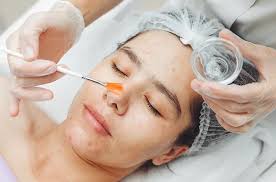Acne-prone skin can be difficult to manage, often leading to breakouts, scarring, and uneven texture. For residents in Dubai seeking an effective skincare solution, chemical peels have emerged as a highly beneficial treatment. These professional exfoliating procedures remove dead skin cells, unclog pores, and stimulate skin renewal, helping to reduce acne and improve overall skin health. Chemical Peels in Dubai are particularly popular among individuals dealing with persistent acne because they provide a targeted approach to treating both active breakouts and post-acne marks.
Best Chemical Peels for Acne
Different types of chemical peels are recommended based on the severity of acne and skin type. Chemical Peels Dubai offers options specifically formulated for acne-prone skin:
- Salicylic Acid Peels: A beta-hydroxy acid that penetrates deep into the pores to dissolve excess oil and prevent clogging. It’s ideal for oily and acne-prone skin, reducing both active acne and blackheads.
- Glycolic Acid Peels: An alpha-hydroxy acid that gently exfoliates the skin’s surface, improving texture, lightening acne scars, and promoting a smoother complexion.
- Lactic Acid Peels: Suitable for sensitive skin, lactic acid helps exfoliate while also providing hydration, reducing the risk of irritation.
- Jessner’s Peel: A combination peel that can address moderate acne, hyperpigmentation, and uneven texture by targeting multiple skin layers simultaneously.
Understanding Acne and Its Causes
Acne develops when excess oil, dead skin cells, and bacteria accumulate in the pores, causing inflammation and pimples. Factors such as hormonal changes, stress, diet, and environmental conditions can exacerbate acne. Chemical peels target these underlying causes by exfoliating the skin, reducing oil buildup, and promoting cellular turnover, which can prevent future breakouts
How Chemical Peels Improve Acne
Chemical peels improve acne-prone skin in several ways:
- Unclogging Pores: By removing dead skin cells and oil, peels prevent pore blockages that lead to breakouts.
- Reducing Inflammation: Many peel formulations have anti-inflammatory properties that calm irritated skin.
- Fading Acne Scars: Repeated treatments stimulate collagen production, gradually improving the appearance of post-acne scars and dark spots.
- Balancing Oil Production: Peels help regulate sebum, reducing shine and preventing future blemishes.
Tailoring the Treatment to Your Skin
Choosing the best peel for acne-prone skin requires professional assessment. A dermatologist or skincare specialist evaluates the severity of acne, skin type, and sensitivity to determine the most suitable peel. Superficial peels are often recommended for mild acne, while medium peels may be used for moderate acne and scarring.
Post-Treatment Care
After a chemical peel, proper skincare is crucial to achieve lasting results. Gentle cleansing, avoiding sun exposure, and using non-comedogenic moisturizers help protect the skin and prevent irritation. Regular follow-up sessions may be recommended to maintain clear, healthy skin.
Long-Term Benefits
Chemical peels not only treat active acne but also support long-term skin health. By encouraging consistent cell turnover and reducing oil buildup, peels create a healthier environment for the skin, preventing recurring breakouts and promoting a more even, radiant complexion.
Final Thoughts
For individuals struggling with acne-prone skin in Dubai, chemical peels provide a highly effective, non-invasive solution. Chemical Peels Dubai help unclog pores, reduce inflammation, fade scars, and regulate oil production, resulting in clearer, smoother, and healthier skin. By selecting the right type of peel and following professional guidance, acne-prone skin can be managed effectively, improving both appearance and confidence over time.






Comments